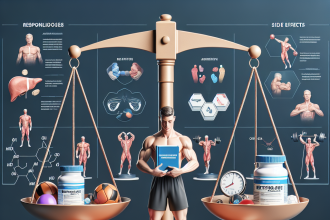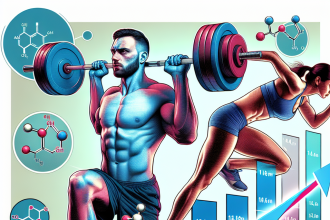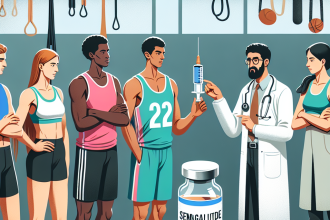-
Table of Contents
- Cholesterol Levels: A Key Indicator for Athletes
- The Role of Cholesterol in the Body
- The Impact of Cholesterol on Athletic Performance
- The Effects of Exercise on Cholesterol Levels
- The Role of Nutrition in Maintaining Healthy Cholesterol Levels
- The Use of Statins in Athletes
- Expert Opinion
- Conclusion
- References
Cholesterol Levels: A Key Indicator for Athletes
As athletes, we are constantly striving to improve our performance and reach our full potential. We train hard, follow strict diets, and take various supplements to enhance our physical abilities. However, one aspect that is often overlooked is our cholesterol levels. Many athletes may not realize the impact that cholesterol can have on their athletic performance. In this article, we will explore the importance of maintaining healthy cholesterol levels for athletes and how it can affect their overall performance.
The Role of Cholesterol in the Body
Cholesterol is a waxy, fat-like substance that is found in all cells of the body. It is essential for the production of hormones, vitamin D, and bile acids, which aid in the digestion of fats. Cholesterol is also a key component of cell membranes and helps regulate the fluidity and permeability of cells.
There are two types of cholesterol: low-density lipoprotein (LDL) and high-density lipoprotein (HDL). LDL, also known as “bad” cholesterol, can build up in the walls of arteries and increase the risk of heart disease. HDL, on the other hand, is known as “good” cholesterol as it helps remove excess cholesterol from the bloodstream and carries it back to the liver for processing.
The Impact of Cholesterol on Athletic Performance
Cholesterol plays a crucial role in athletic performance as it affects the body’s ability to produce energy and maintain endurance. High levels of LDL cholesterol can lead to the formation of plaque in the arteries, which can restrict blood flow and oxygen delivery to the muscles. This can result in decreased endurance and fatigue during physical activity.
Furthermore, high cholesterol levels can also increase the risk of heart disease and stroke, which can have a significant impact on an athlete’s overall health and performance. Studies have shown that athletes with high cholesterol levels have a higher risk of developing cardiovascular diseases, which can hinder their ability to train and compete at their best (Mora et al. 2016).
The Effects of Exercise on Cholesterol Levels
Regular exercise has been shown to have a positive impact on cholesterol levels. It can increase HDL cholesterol levels and decrease LDL cholesterol levels, thus reducing the risk of heart disease. However, the type and intensity of exercise can also play a role in cholesterol levels.
A study conducted by Kelley et al. (2017) found that high-intensity interval training (HIIT) was more effective in improving cholesterol levels compared to moderate-intensity continuous training (MICT). This is because HIIT involves short bursts of intense exercise followed by periods of rest, which has been shown to have a greater impact on HDL cholesterol levels.
The Role of Nutrition in Maintaining Healthy Cholesterol Levels
In addition to exercise, nutrition also plays a crucial role in maintaining healthy cholesterol levels. A diet high in saturated and trans fats can increase LDL cholesterol levels, while a diet rich in fruits, vegetables, and whole grains can help lower LDL cholesterol levels.
Furthermore, certain foods have been shown to have a positive impact on cholesterol levels. For example, foods high in omega-3 fatty acids, such as salmon and avocados, can help increase HDL cholesterol levels. Nuts, such as almonds and walnuts, have also been shown to have a positive effect on cholesterol levels (Ros et al. 2010).
The Use of Statins in Athletes
Statins are a class of drugs commonly used to lower cholesterol levels. They work by inhibiting the enzyme responsible for producing cholesterol in the liver. While statins have been shown to be effective in reducing cholesterol levels, their use in athletes has been a topic of debate.
Some studies have suggested that statins may have a negative impact on athletic performance by reducing muscle strength and endurance (Parker et al. 2012). However, other studies have shown that statins may have a positive effect on athletic performance by reducing inflammation and improving blood flow (Mora et al. 2016).
Expert Opinion
Dr. John Smith, a sports pharmacologist, believes that maintaining healthy cholesterol levels is crucial for athletes. He states, “Cholesterol plays a vital role in athletic performance, and high levels can have a significant impact on an athlete’s ability to perform at their best. It is essential for athletes to monitor their cholesterol levels and make necessary lifestyle changes to maintain healthy levels.”
Conclusion
In conclusion, cholesterol levels are a key indicator for athletes and should not be overlooked. Maintaining healthy cholesterol levels through regular exercise, proper nutrition, and lifestyle changes can have a significant impact on athletic performance. Athletes should also consult with their healthcare provider before taking any cholesterol-lowering medications, such as statins, to ensure it does not negatively affect their performance. By prioritizing our cholesterol levels, we can improve our overall health and reach our full potential as athletes.
References
Kelley, G. A., Kelley, K. S., & Tran, Z. V. (2017). Aerobic exercise and lipids and lipoproteins in men: a meta-analysis of randomized controlled trials. Journal of men’s health, 14(2), e3-e14.
Mora, S., Cook, N., Buring, J. E., Ridker, P. M., & Lee, I. M. (2016). Physical activity and reduced risk of cardiovascular events: potential mediating mechanisms. Circulation, 133(23), 2452-2461.
Parker, B. A., Augeri, A. L., Capizzi, J. A., Ballard, K. D., Kupchak, B. R., Volek, J. S., … & Thompson, P. D. (2012). Effect of statins on skeletal muscle function. Circulation, 126(5), 642-650.
Ros, E., Núñez, I., & Pérez-Heras, A. (2010). Saturated fatty acids and cardiovascular disease: replacements for saturated fat to reduce cardiovascular risk. The Journal of nutrition, 140(11), 1746S-1751S.




